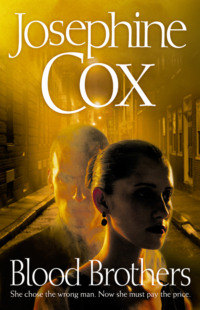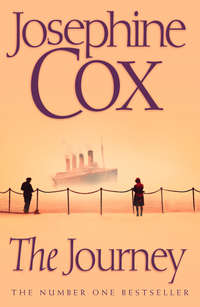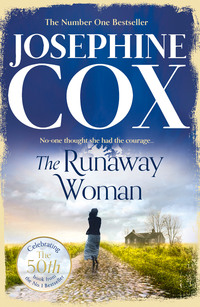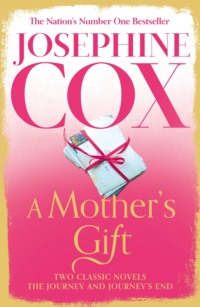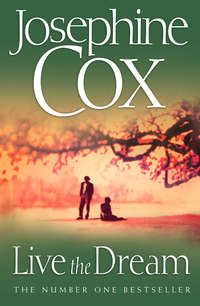
Полная версия
Josephine Cox Sunday Times Bestsellers Collection

The Journey
Journey’s End
The Loner
Born Bad
Three Letters
The Broken Man
Josephine Cox

Copyright
Published by HarperCollinsPublishers Ltd
1 London Bridge Street
London SE1 9GF
www.harpercollins.co.uk
The Journey First published in Great Britain by HarperCollinsPublishers 2005
Journey’s End First published in Great Britain by HarperCollinsPublishers 2006
The Loner First published in Great Britain by HarperCollinsPublishers 2007
Born Bad First published in Great Britain by HarperCollinsPublishers 2009
Three Letters First published in Great Britain by HarperCollinsPublishers 2012
The Broken Man First published in Great Britain by HarperCollinsPublishers 2013
Copyright © Josephine Cox 2014
Jacket layout design © HarperCollinsPublishers Ltd 2014
Josephine Cox asserts the moral right to be identified as the author of this work.
A catalogue copy of this book is available from the British Library.
This novel is entirely a work of fiction. The names, characters and incidents portrayed in it are the work of the author’s imagination. Any resemblance to actual persons, living or dead, events or localities is entirely coincidental.
All rights reserved under International and Pan-American Copyright Conventions. By payment of the required fees, you have been granted the non-exclusive, non-transferable right to access and read the text of this e-book on screen. No part of this text may be reproduced, transmitted, down-loaded, decompiled, reverse engineered, or stored in or introduced into any information storage and retrieval system, in any form or by any means, whether electronic or mechanical, now known or hereinafter invented, without the express written permission of HarperCollins.
Source ISBN: 9780007146147, 9780007146178, 9780007279548, 9780007290048, 9780007419975, 9780007419906
Ebook Edition © July 2014 ISBN: 9780007590667
Version: 2017-05-23
Table of Contents
Cover
Title Page
Copyright
The Journey
Journey’s End
The Loner
Born Bad
Three Letters
The Broken Man
About the Author
Also by Josephine Cox
About the Publisher

JOSEPHINE COX

The Journey

DEDICATION
For my darling Ken, as ever
CONTENTS
TITLE PAGE
DEDICATION
PART ONE
CHAPTER ONE
CHAPTER TWO
CHAPTER THREE
CHAPTER FOUR
CHAPTER FIVE
PART TWO
CHAPTER SIX
CHAPTER SEVEN
CHAPTER EIGHT
CHAPTER NINE
CHAPTER TEN
CHAPTER ELEVEN
CHAPTER TWELVE
CHAPTER THIRTEEN
PART THREE
CHAPTER FOURTEEN
CHAPTER FIFTEEN
CHAPTER SIXTEEN
CHAPTER SEVENTEEN
CHAPTER EIGHTEEN
CHAPTER NINETEEN
CHAPTER TWENTY
PART FOUR
CHAPTER TWENTY-ONE
ACKNOWLEDGEMENTS
Chapter 1
Salford, Bedfordshire
HE HAD SEEN them twice before, and each time his curiosity was aroused. Arm-in-arm, the two women would come softly into the churchyard, place their flowers, and linger awhile before leaving in the same discreet manner in which they had arrived.
Today, as his bumbling black Labrador Chuck tugged on the lead, the dog’s nostrils twitching at the secret scent of rabbits in the churchyard, the women came again. He tried not to seem interested, but the moment they walked through the gate and passed him by, he could not stop himself from sneaking a glance. They acknowledged him with a polite nod of the head, then moved on, intent about their business. It was almost as if he was not there.
In her own way, each of the women was beautiful. The taller of the two, who looked about fifty, had long chestnut-brown hair, grey in places, tied back with a ribbon, and lovely golden-brown eyes, a smart though ample figure and softly rounded features. Today, the bouquet of evergreens cradled in her arm seemed to accentuate her beauty; though it was not a virgin beauty, for the crippling seasons of time and emotion were deeply etched in her face.
She walked with a stick, long and slender with bone handle and silver-capped toe. It was obvious that she was crippled in some slight way, though this did not detract from her air of dignity and sense of purpose. With her sombre bearing and her carefully-measured steps, she made a striking figure.
He knew they were headed for the same headstone, where he himself had paused many times. In the shape of a cross, the headstone was small and nondescript, yet the words written there were so powerful, they raised that humble stone above all others. The words, carved deep, read:
BARNEY DAVIDSON
1890–1933
A MAN OF COURAGE. HE MADE THE GREATEST SACRIFICE OF ALL.
Having read the inscription and been intrigued by it, Ben knew it off by heart. It had set his thoughts alight with all manner of questions. What had this man done to deserve such an accolade? What did the words mean? And who had ordered them to be inscribed? Somehow, he didn’t think it had anything to do with the heroism of war. This Barney Davidson would have been twenty-four when World War One broke out – and no doubt the young man had played his part – but he had died well before the second lot.
His attention was drawn to the two women.
With such tenderness that it took him aback, the older one stroked the tips of her fingers over the dead man’s name. Her voice broke with pride as she murmured, ‘Oh, my dearest Barney.’ In that moment when she lifted her gaze to the heavens, her brown eyes glittered with tears. So much pain, he thought. So much emotion.
He sensed that, somewhere deep inside, she carried a terrible burden. What was that old saying? ‘The eyes are the mirror of the soul.’ He wondered what sorrowful secrets were hers.
The man’s discreet gaze went now to the younger woman. Smaller, with a neat, if slightly plump figure, her fair hair was bobbed to the shoulders, and even from where he stood, he could see that her pretty eyes were the deepest shade of blue lavender. He imagined that normally, those eyes were quick to smile – but not today. Today her concerned gaze was trained on the older woman.
The two visitors were sensibly dressed. Like himself, each wore a long coat and sturdy shoes, for the weather had been foul of late, and in places the ground underfoot was treacherous.
In the early hours of this January Sunday in 1952, ditches and paths had run high with the melting remnants of a heavy snowfall. By midday the wind had heightened and now, judging by the darkening skies, it seemed a new storm was gathering.
‘Here, Chuck. Here, boy!’ he said in a harsh whisper, and tugged on the leash, quickly bringing the dog to heel. In a burst of affection, the animal jumped up and licked him, nearly sending him flying. Recovering, he patted the dog, then set off for the lych-gate and home.
He was only a few strides away from Barney Davidson’s tomb when the women left it and began walking on, merely an arm’s reach in front of him. Slowing his step, he continued to follow, the dog plodding obediently at his side.
They were almost at the gate when the older woman’s stick slipped in the mud and she fell heavily, seeming to twist her leg as she did so.
When her young companion cried out and immediately began struggling to bring her upright, he ran forward. ‘Please … let me help?’ Sliding his two hands under the older one’s arms, he gently hoisted her up. When she seemed steady, he let go, recovered her walking stick and handed it to her. ‘No real harm done, I hope?’ he said politely.
‘Thank you.’ Her dark eyes appraised him. ‘As you can see, I’m not as agile as I once was.’
A softer voice interrupted. ‘Yes, thank you, Mr … ?’ The young woman frowned. ‘How can we thank you properly, when we don’t know your name?’
His warm gaze enveloped her pretty face. ‘The name’s Ben,’ he revealed. ‘Benjamin Morris.’ Holding out his hand in greeting, he was pleasantly surprised and thrilled when she put her small hand in his. Surprised, because he found her grip firm and strong, as though she worked with her hands in some way. Thrilled because she seemed to hold on just that moment longer than necessary.
Having witnessed his reaction, the older woman gave a pleasant laugh. ‘My daughter Mary has a strong grip for a little one, don’t you think?’
Mary tried to explain. ‘It comes from gardening,’ she said shyly. ‘A few years ago our old gardener retired, and rather than take on someone new, I persuaded Mother to let me have a go at the job.’ Her face flushed with pleasure. ‘It’s hard work, mind, but I love every minute of it.’
‘Mary is a worker, all right,’ her mother declared. ‘When she’s not up to her eyes in the garden, she works five days a week in her flower-shop in Leighton Buzzard, and whenever the chance arises, she’s out and about delivering the flowers herself, driving the shop-van.’ Tutting, she finished quietly, ‘I don’t know where she finds the energy!’
‘A busy lady then?’ Ben looked down into that bright lively face and wondered why she was not married. ‘And may I ask what you do in this garden of yours?’
It was the mother who answered. ‘She spends every spare minute she’s got in it, that’s what she does!’ From the reproachful glance she gave Mary, it was apparent that she thought her daughter should be enjoying her life and doing other things while she was still young. ‘She grows all our own produce,’ she said proudly, ‘and she’s completely redesigned the garden, made it into a little paradise with delightful walkways and colourful blossom round every corner, except,’ she glanced at the ominous skies, ‘of course, on days like this.’
‘Then it sounds like time well spent,’ Ben commented. He wondered why it was that Mary spent every spare minute in the garden. Did she never go out? Was she never approached by men who would like to enjoy her company? She was such a fetching little thing, he certainly wouldn’t mind the opportunity to get to know her better.
‘Oh, but the garden is so lovely!’ That was the mother talking again. ‘She’s even managed to carve out a number of little nooky holes – quiet places where you can escape the weather and enjoy your own company.’
The younger woman’s soft voice intervened. ‘I just thought it would be nice to have a quiet place where you could hide from the rest of the world.’ Blushing under her mother’s lavish praise, Mary made an effort to divert attention from herself. ‘Do you like gardening, Mr Morris?’
For a long moment he gazed down on her, his heart turning over like never before. ‘Why would you want to hide from the rest of the world?’ he asked, ignoring her question.
Mary had not expected him to answer with a question of his own. ‘Isn’t that what we all sometimes need?’ she asked cagily.
He wasn’t sure how to respond to that, so he didn’t. Instead he went back to her original question. ‘I farm,’ he answered lamely. ‘I’m afraid there isn’t a great deal of leisurely time left for gardening, or much else.’
Her smile was appreciative. ‘In a way, farming could be called gardening, only on a larger scale … don’t you think?’
‘If you say so.’ When those lavender-blue eyes beamed as they did now, her whole face seemed to light up.
‘Well, I never!’ With a quick, mischievous smile on her face, the older woman reminded them, ‘There’s me badly injured, and you two exchanging pleasantries as if I wasn’t even here.’
The pair of them were mortified. ‘Whatever am I thinking of!’ Ben exclaimed. ‘I’m so sorry.’ He had been so occupied with the daughter, he had neglected the mother, and he was ashamed.
‘I must get Mother home.’ With her eyes still on Ben, Mary shifted closer to the older lady. ‘I don’t know what I would have done if you hadn’t been here just now.’
She had seen this stranger before, striding down the streets of Salford with his faithful dog in tow as she drove past in her van. Discreetly taking stock of him now that he was here, close beside her, she liked what she saw. Handsome, of manly build, with dark, expressive eyes, he seemed to be taken with her, and it was strange, but she felt oddly drawn to him.
‘I’m glad to have been of help.’ He wondered how he could sound so calm with his heart thumping fifteen to the dozen.
He glanced at the older woman and caught the glint in her smiling eyes; he realised she was taking everything in. He gestured at her ankle. ‘From the look of it, I don’t think you’ve broken anything.’
She nodded. ‘It’s probably just a sprain. Once I get home and put my feet up, I’ll be right as rain.’
‘It’s best you don’t put too much weight on that foot.’ Pointing across the fields, to the rambling, white-washed house in the distance, he informed them, ‘Far Crest Farm, that’s where I live. I’ll help you up there, shall I, to take a look at the ankle and see what can be done.’
Sensing their reluctance, he quickly added, ‘Or, if you’d prefer, I could nip up and get my car and take you home. It’s only a few minutes to the farmhouse.’
The older woman thanked him. ‘Don’t think I’m not grateful.’ She had a natural friendliness in her manner that warmed him to her. ‘But I’ll be well taken care of. Look there?’ Gesturing to the long dark car that waited by the kerbside outside the church, she revealed, ‘I have a car and driver waiting.’
Flustered, Ben apologised. ‘Oh, I’m sorry. I didn’t realise …’
‘How could you?’ Her smile deepened. ‘I might be a frail old biddy walking with the aid of a stick, but as you see, I’m not short of a bob or two.’
Ben smiled. ‘You don’t strike me as a frail old biddy,’ he remarked, holding open the lych-gate for the two women to pass through it. ‘In fact, I imagine if anyone got on the wrong side of you, they might rue the day.’
The girl Mary had to smile at his comment. ‘You’re absolutely right. What you see is not always what you get.’ She gave her mother a curious glance. ‘Still waters run deep, isn’t that what they say?’
The older woman nodded but said nothing, though her gaze roamed back to the headstone, and the name Barney.
He had been a man amongst men, she thought. A man of such bravery it made her humble. Even now after all these years her heart wept for him, and for the unbearable torment he had endured, all in the name of love.
‘Oh, look! Here comes Adam now.’ As the driver approached to help her down the pavement, she reached out and shook Ben by the hand. ‘You’ve been very kind, Mr Morris. Thank you again.’
Leaning on the arm of her driver, she set off for the comfort of the big car, calling as she went, ‘By the way, my name is Lucy.’ She had taken a liking to this young fella me lad and, from the look on her daughter’s face, she suspected Mary had done the same.
‘Goodbye then,’ Ben replied. ‘Take care of yourself.’
‘Not goodbye,’ Mary said hopefully. ‘I’m sure our paths will cross again.’
He smiled into her eyes. There was so much he would have liked to say, but not now. Maybe not ever, he thought sadly.
In a moment the women were gone, and he felt lonely, as never before. Retracing his footsteps to the simple headstone, he read out the inscription. ‘He made the greatest sacrifice of all …’
The words burned in his soul. ‘Barney Davidson …’ he mused aloud. ‘Lucy’s husband, maybe? Her brother?’ Somehow he didn’t think so. His curiosity heightened. ‘What great sacrifice did you make, Barney?’ he wondered.
Deep in thought, he almost leaped out of his skin when a quiet voice said over his shoulder, ‘Barney was Lucy’s husband – died soon after they moved here. And as for the inscription … I’ve wondered that myself, many a time.’
Swinging round, Ben came face to face with the new vicar, the Reverend Michael Gray. ‘Oh, it’s you, Vicar!’ He greeted the older man with a sheepish grin. ‘I don’t usually make a habit of talking to myself,’ he explained, ‘but I must admit, I am curious.’
‘You know what they say about a man who talks to himself?’ In his late fifties, balding and bespectacled, Mike Gray had the hang-dog look of a man with the weight of the world on his shoulders. And yet his smile was heavenly.
When he began walking towards the gate, Ben went with him. ‘As you know, I’ve only been here a matter of a few months,’ the vicar went on to remind him, ‘but like you, I’m intrigued by that grave.’
‘Maybe you should ask the ladies?’ Ben suggested. ‘I’m sure they wouldn’t mind it coming from you – I mean, you being their vicar here at Saint Andrew’s.’
Mike Gray shook his head. ‘There have been times when I was sorely tempted to ask,’ he confessed, and slid a finger round to loosen his dog-collar. ‘Then I felt I might be intruding, so I thought it best to wait, at least until I know them a little better. They’ve been worshipping here for around twenty years, I believe. But of course, the war has occupied everyone’s thoughts, and that tombstone is old history now.’
‘You’re probably right,’ Ben replied. ‘All the same, it’s a curious thing, an inscription like that.’
‘Yes. As you say, a curious thing.’ The Reverend paused to stroke Chuck’s glossy head. ‘Our man obviously did something out of the ordinary.’ His features crinkled into a wry little smile. ‘It’s to be hoped we might all of us aspire to great things before we’re called.’ Raising his gaze to the skies, he gave a long, deep sigh. ‘Sadly, a lot of poor devils had to be heroes in the war, whether they wanted to, or not. The truth of it is, most of us simply do not have greatness in us.’
By the time they reached the gate, the men had covered every possibility. ‘Maybe he saved a life by forfeiting his own?’ Ben speculated.
‘Mmm.’ The vicar nodded. ‘Or he may have shown true bravery during the Great War. Certainly his age suggests he could well have been called up to serve his country.’
Ben considered that. ‘Could be.’
Pausing in his stride, Mike Gray glanced back towards the headstone, now dim in the failing light. ‘Whatever that inscription means,’ he declared soundly, ‘we can assume that our Barney Davidson was a remarkable man.’
Hearing a scuffle behind a great yew that stood near the vestry, Chuck suddenly slipped his lead and raced off. While Ben called him back, the vicar had spotted a dark object lying on the ground. He stooped to pick it up. ‘Well, I never!’ He wiped off the smears of dirt and dampness with the cuff of his sleeve.
A knowing smile creased his face. ‘This must belong to one of our ladies,’ he said. ‘Maybe, if you were to return this, you might be privileged to discover the true nature of that inscription?’
‘Mary’s mother must have dropped it when she fell over earlier. I would gladly deliver the handbag.’ Ben recalled the young woman and those pretty lavender-blue eyes. It would be good to see her again, he thought. ‘Only I don’t know where they live.’
‘Couldn’t be easier. They live at Knudsden House – you must know the place,’ the Reverend Gray prompted. ‘I recall admiring it when I came into the village for the first time. It’s that big Edwardian house, with the large, beautifully kept gardens. You can’t miss it.’
Ben had seen the place. An architect by training, he took a keen interest in the buildings around him. ‘Of course!’ he cried. ‘It’s the one set back from the lane, behind tall iron gates.’ He shook his head in disbelief. ‘I would never have guessed they lived there.’ Somehow, despite the elegant walking stick, and the chauffeur-driven car, he had pictured the women living in a large rambling cottage, with thatched roof and roses growing at the door.
The vicar remarked thoughtfully, ‘According to my housekeeper, Knudsden house used to belong to the village squire; he passed on some twenty years ago, and the house was put up for sale.’
Taking a moment to recall his housekeeper’s exact words, he went on, ‘It was then bought by Mr Davidson and his wife. Their daughter Mary was just an infant at the time. They were a family who preferred to keep themselves very much to themselves.’
There was a silence as Ben digested all of this information.
The vicar added thoughtfully, ‘For a long time they rarely ventured out. In recent years though, they have concerned themselves more with the community, and have given generously to any good cause; the daughter with her time and labour, and the mother with cash donations.’
‘Hmh! For someone who knows very little about the family, you seem to have gathered a fair amount of information.’
‘So I have.’ The vicar had surprised himself. ‘Don’t forget, I have my spies,’ he said wryly. ‘My housekeeper comes from a long line of gossips who’ve lived in this village since time began, so it goes without saying that what she doesn’t know isn’t worth knowing. Mind, the dead are good at keeping secrets – and even she doesn’t know the answer to the mystery of that inscription.’
When the Labrador bounded up, Ben grabbed his lead and wound it around his wrist. He shivered. The temperature had dropped, almost while they were talking.
‘And what about the daughter?’ Ben asked. ‘Did she attend the village school?’
‘No. Mary was educated at home. A tutor arrived each morning and departed every afternoon.’ The vicar’s voice dropped to a whisper. ‘It must have been a very lonely life for a little girl.’
Ben was thinking the very same, and his heart went out to her. ‘So, as far as you know, she never made friends?’
‘From what I’m given to understand, the daughter has no close friends, but she does get on very well with the two women who help them out. Elsie Langton does a bit of housekeeping. Her married daughter Rona works in the flower-shop. Mary is closer to Rona, which is understandable when they’re at the shop together most days.’
Ben had heard the name. ‘Is that the same Langton who keeps the smithy on the farm adjoining mine?’


